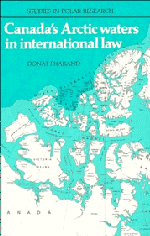Book contents
- Frontmatter
- Contents
- Figures
- Tables
- Foreword
- Preface
- Acknowledgements
- Part 1 The Waters of the Canadian Arctic Archipelago and the Sector Theory
- 1 The origins of the sector theory
- 2 Boundary treaties as a legal basis for the sector theory
- 3 Contiguity as a basis for the sector theory
- 4 Customary law as a basis for the sector theory
- Notes
- Part 2 The Waters of the Canadian Arctic Archipelago as Historic Waters
- Part 3 The Waters of the Canadian Arctic Archipelago and Straight Baselines
- Part 4 The Waters of the Canadian Arctic Archipelago and the Northwest Passage
- Notes
- General Conclusion
- Appendix A The 1825 Boundary Treaty, Great Britain and Russia
- Appendix B The 1867 Boundary Treaty, United States and Russia
- Selected bibliography
- Index
4 - Customary law as a basis for the sector theory
Published online by Cambridge University Press: 20 January 2010
- Frontmatter
- Contents
- Figures
- Tables
- Foreword
- Preface
- Acknowledgements
- Part 1 The Waters of the Canadian Arctic Archipelago and the Sector Theory
- 1 The origins of the sector theory
- 2 Boundary treaties as a legal basis for the sector theory
- 3 Contiguity as a basis for the sector theory
- 4 Customary law as a basis for the sector theory
- Notes
- Part 2 The Waters of the Canadian Arctic Archipelago as Historic Waters
- Part 3 The Waters of the Canadian Arctic Archipelago and Straight Baselines
- Part 4 The Waters of the Canadian Arctic Archipelago and the Northwest Passage
- Notes
- General Conclusion
- Appendix A The 1825 Boundary Treaty, Great Britain and Russia
- Appendix B The 1867 Boundary Treaty, United States and Russia
- Selected bibliography
- Index
Summary
In spite of the conclusion that the sector theory cannot find a valid legal basis in the concept of contiguity, the practice of States might be such that the theory has resulted in a principle of customary law. This would appear to be the view held by a small number of authoritative commentators. For instance, Professor J. S. Reeves wrote, in a brief comment on Antarctic sectors in 1939, that ‘[o]ne may assert that the sector principle as applied at least to Antarctica is now part of the accepted international legal order’. Numerous references to State practice are also found in the writings of proponents of the sector theory, such as David Hunter Miller and W. L. Lakhtine.
The above statement by Professor Reeves did not go unchallenged and, in 1948, Professor Waldock expressed his disagreement with the notion that State practice had resulted in a new rule of international law. Having referred to Professor Reeves' statement, he wrote:
It is, however, scarcely possible to regard state practice as sufficiently certain and general to establish a new rule of international law. The United States, a potential claimant in both the Arctic and Antarctic, has consistently denied that sector claims have any legal force. Neither Norway nor Denmark has claimed Arctic sectors. Nor have non-sector states given any recognition to the legality of sectors. On the contrary, Nazi Germany was showing signs of claiming part of Norway's sector and Japan entered a reservation on hearing of Chile's declaration. Moreover, Chile and Argentina are contesting the United Kingdom's sector.
Some 35 years having passed since Professor Waldock's examination of State practice, it is now advisable to re-examine the question.
- Type
- Chapter
- Information
- Canada's Arctic Waters in International Law , pp. 44 - 79Publisher: Cambridge University PressPrint publication year: 1988



